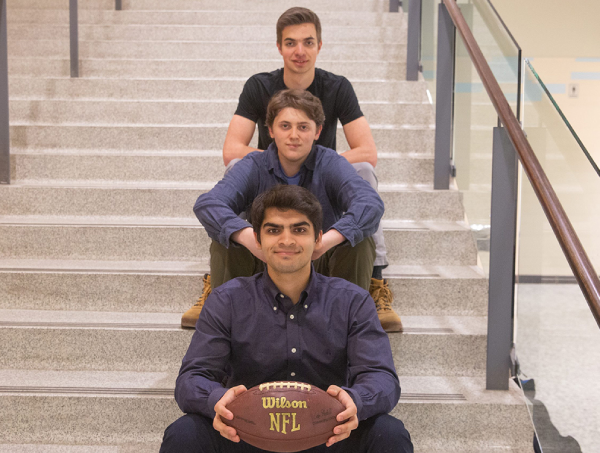
Big win for Canadian students in international data analytics challenge
Canadian university students continue to prove their dominance in the field of sports analytics. For the second year in a row, a team of Canadian university students has won the National Football League’s (NFL) “Big Data Bowl.”
The NFL Scouting Combine in Indianapolis on Wednesday night saw a group of expert judges choosing a submission from a trio of University of Toronto undergraduates as the 2023 Big Data Bowl champion. Hassaan Inayatali, Aaron White, and Daniel Hocevar beat out entries submitted by some 400 of the globe’s top sports-analytics minds.
The team of students from the University of Toronto has shown that Canada is at the forefront of global sports-analytics innovation.
The trio’s scientific “process was correct,” said team leader Inayatali in a phone interview Thursday afternoon. Inayatali, an engineering-science major between his third and fourth years, added that “Each of us now knows how we would proceed with any given project on any given sport.
Giving your audience an easy and understandable way to look at data. That’s one of the biggest keys in any sports analytics project because if you develop something really complex that they don’t understand, they’re not going to want to use it.”
This year’s Big Data Bowl charge to sports-data scientists was to devise better, more detailed measures for assessing pass-blocking and pass-rushing performances in the NFL – both collectively as units and individually. Currently, the only generally accepted statistical means of measuring pressure applied by a defense’s pass rushers in pursuit of the other team’s quarterback are sacks, hurries, or QB hits. Similarly, pass-blocking effectiveness is measured only by those same measures, but in the reverse. That is, via those allowed, not forced.
Inayatali, White, and Hocevar, all members of the University of Toronto’s sports-analytics student group named UTSPAN, developed several new analytical statistical metrics for measuring NFL pass rushing and pass protection. These include continuous pocket pressure (CPP), offensive pocket life expectancy (OPLE), defensive pocket life expectancy (DPLE), and surplus pressure (SP).
Thanks to tracking devices worn by every NFL player, the precise position, direction, and speed of every player at any moment, on any given play, is recorded. The league partners with Amazon Web Services to collate this data for its Next Gen Stats operation, which for six years has offered far broader and more analytically meaningful stats. The league made this detailed data available to this year’s Big Data Bowl participants from a large sample of games from the 2021 season.
The University of Toronto trio believes that a big part of their presence at the combine this week was all the flattering and helpful feedback they received, in person, from data scientists and NFL sports-analytics experts alike, even some coaches. Their new metrics will be considered by Next Gen Stats for potential use on an ongoing basis, including by networks on telecasts.
Last year, a team of graduate students at Simon Fraser University in Burnaby, B.C., won the Big Data Bowl. Robyn Ritchie, Brendan Kumagai, Ryker Moreau, and Elijah Cavan comprised the team, and they won by devising a novel metric to predict expected return yards remaining on a play after various decisions. It was the first time a team of university students had won the competition, and the first time a winning team had a female member.
It’s no coincidence that Canadian university students have won back-to-back Big Data Bowl victories. Inayatali believes that it’s more about the communities of the two universities. “If you look at Simon Fraser, they have some great, well-known sports-analytics professors.

